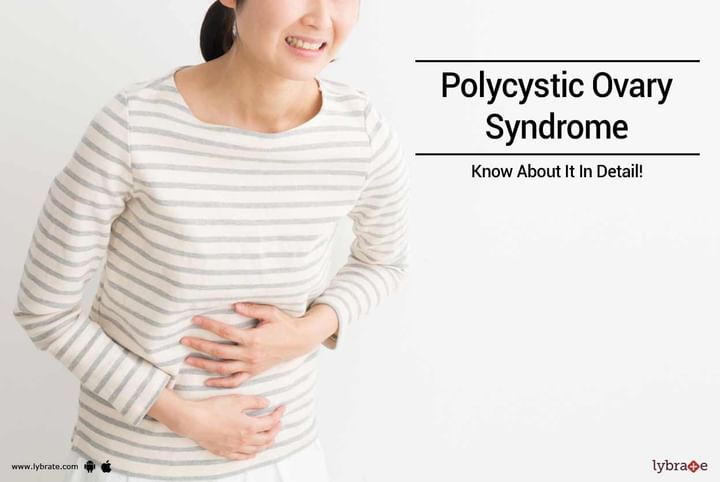Polycystic Ovary Syndrome - Know About It In Detail!
What is polycystic ovary syndrome?
PCOS is a condition that can affect your periods, fertility, hormones and aspects of your appearance. It can also affect your long-term health. It affects 4 to 12 in every 100 women.
What are polycystic ovaries?
Polycystic ovaries are slightly larger than normal ovaries and have twice the number of follicles (fluid-filled spaces within the ovary that release the eggs when you ovulate). Having polycystic ovaries does not necessarily mean that you have PCOS. Women with PCOS have symptoms as well as polycystic ovaries.
What are the symptoms of PCOS?
The symptoms of PCOS include:
-
Irregular menstrual periods—Menstrual disorders can include absent periods, periods that occur infrequently or too frequently, heavy or unpredictable periods
-
An increase in facial or body hair (hirsutism)- face, chest, abdomen and upper thighs
-
Thinning hair/loss of hair on your head (male pattern baldness)
-
Being overweight/rapid increase in weight or having difficulty losing weight
-
Difficulty becoming pregnant (reduced fertility)
-
Oily skin, acne
-
Patches of thickened, velvety, darkened skin called acanthosis nigricans
-
Skin tags, which are small flaps of excess skin in the armpits or neck area
-
Depression and psychological problems can also result from having PCOS.
The symptoms vary from woman to woman. Some women have very few and mild symptoms, while others are affected more severely by a wider range of symptoms.
PCOS is a cause of fertility problems in women. You may still become pregnant even if you do not have periods. If you do not want to become pregnant, you should seek advice from your gynaecologist about contraception.
What causes PCOS?
The cause of PCOS is not yet known but it often runs in families. If any of your relatives (mother, aunts, sisters) are affected with PCOS, your risk of developing PCOS may be increased.
The symptoms are related to abnormal hormone levels:
Testosterone is a hormone that is produced in small amounts by the ovaries in all women. Women with PCOS have higher than normal levels of testosterone and this is associated with many of the symptoms of the condition- the ovaries may be prevented from releasing an egg each month (a process called ovulation). High testosterone levels also cause the unwanted hair growth and acne seen in many women with PCOS.
Insulin is a hormone that controls the level of glucose (a type of sugar) in the blood. If you have PCOS, your body may not respond to insulin (this is known as insulin resistance), so the level of glucose is higher. To try to prevent the glucose levels becoming higher, your body produces even more insulin. High levels of insulin can lead to weight gain, irregular periods, fertility problems and higher levels of testosterone.
How is PCOS diagnosed?
Having polycystic ovaries does not mean you have PCOS.
Women with PCOS often have symptoms that come and go, particularly if their weight goes up and down. This can make it a difficult condition to diagnose, which means it may take a while to get a diagnosis.
A diagnosis is made when you have any two of the following:
-
Irregular, infrequent periods or no periods at all
-
An increase in facial or body hair and/or blood tests that show higher testosterone levels than normal
-
An ultrasound scan that shows polycystic ovaries
When a diagnosis is made, you may be referred to an endocrinologist (a doctor who specialises in the hormonal system).
What are the health risks for women with PCOS?
PCOS affects all areas of the body, not just the reproductive system. If you have PCOS, you are at greater risk of developing the long-term health problems discussed below.
Insulin resistance and diabetes
One or two in every ten women with PCOS go on to develop diabetes at some point. If the diabetes is untreated, this can cause damage to organs in the body.
If you have PCOS, your risk of developing diabetes is increased further if you:
-
are over 40 years of age
-
have relatives with diabetes
-
developed diabetes during a pregnancy (known as gestational diabetes)
-
are obese (a body mass index (BMI) of over 30)
Women with PCOS tend to have high blood pressure, which is likely to be related to insulin resistance and to being overweight rather than to the PCOS itself. High blood pressure can lead to heart problems and should be treated.
Cancer of the womb lining (endometrium)
If you have fewer than three periods a year, the lining of the womb (endometrium) can thicken (a condition called endometrial hyperplasia) and this may lead to endometrial cancer in a small number of women over the long term.
There are various ways to protect the lining of the womb using the hormone progestogen. This may include a five-day course of progestogen tablets used every three or four months, taking a contraceptive pill or using the intrauterine contraceptive system (Mirena®). The options will depend on whether you are trying for a baby.
Depression and mood swings
The symptoms of PCOS may affect how you see yourself and how you think others see you. It can lower your self-esteem.
Snoring and daytime drowsiness
PCOS can lead to fatigue or sleepiness during the day. It is also associated with snoring.
What can I do to reduce long-term health risks?
Have a healthy lifestyle
The main ways to reduce your overall risk of long-term health problems are to:
-
Eat a healthy balanced diet. This should include fruit and vegetables and whole foods (such as wholemeal bread, whole-grain cereals, brown rice and whole-wheat pasta), lean meat, fish and chicken. You should cut down the amount of sugar, salt and caffeine that you eat and drink. You should not drink more alcohol than is recommended (14 units a week for women).
-
Eat meals regularly, especially breakfast
-
Take exercise regularly (30 minutes at least three times a week).
You should aim to keep your weight to a level that is normal. BMI is the measurement of weight in relation to height and you should aim to keep your BMI between 19 and 25. If you are overweight, it would be helpful to lose weight and maintain your weight at this new level.
The benefits of losing weight include:
-
a lower risk of insulin resistance and developing diabetes
-
a lower risk of heart problems
-
a lower risk of cancer of the womb
-
more regular periods
-
an increased chance of becoming pregnant
-
a reduction in acne and a decrease in excess hair growth over time
-
improved mood and self-esteem.
You only have to lose a small amount of weight to make a difference to your symptoms and your health.
Have regular health checks
Once you have a diagnosis of PCOS, you will be monitored to check for any early signs of health problems:
- Diabetes: Women with PCOS over the age of 40 should be offered a blood sugar test once a year to check for signs of diabetes. If your BMI is 30 or over or you have a family history of diabetes you should be tested for diabetes even earlier.
- Cancer of the womb: If you have not had a period for a long time (over 4 months) or have irregular bleeding, it is advisable to see your doctor. You may be offered tests like an ultrasound scan of your womb (uterus) or treatment to make you have a period if they are very irregular.
- High blood pressure: Discuss with your doctor how often you should have your blood pressure checked and whether you should have blood tests to check your cholesterol levels.
- Depression and psychological problems: You can be referred to a counsellor or trained specialist if necessary.
Are treatments available for women with PCOS?
There is no cure for PCOS. Medical treatments aim to manage and reduce the symptoms or consequences of having PCOS. Medication alone has not been shown to be any better than healthy lifestyle changes (weight loss and exercise).
Many women with PCOS successfully manage their symptoms and long-term health risks without medical intervention. They do this by eating a healthy diet, exercising regularly and maintaining a healthy lifestyle.
Treatment is tailored to each woman according to symptoms, other health problems, and whether she wants to become pregnant.
How can combined hormonal birth control pills be used to treat women with PCOS?
Combined hormonal birth control pills can be used for long-term treatment in women with PCOS who do not wish to become pregnant. Combined hormonal pills contain both estrogen and progestin. These birth control pills regulate the menstrual cycle and reduce hirsutism and acne by decreasing androgen levels. They also decrease the risk of endometrial cancer.
How can insulin-sensitizing drugs help treat women with PCOS?
Insulin-sensitizing drugs (eg. Metformin) used to treat diabetes frequently are used in the treatment of PCOS. These drugs help the body respond to insulin. In women with PCOS, they can help decrease androgen levels and improve ovulation. Restoring ovulation helps make menstrual periods regular and more predictable.
Hair removal or slowing hair growth: You can try facial hair removal creams, laser hair removal, or electrolysis to remove excess hair. A prescription skin treatment (eflornithine HCl cream) can slow down the growth rate of new hair in unwanted places.
What can be done to increase the chances of pregnancy for women with PCOS?
Successful ovulation is the first step toward pregnancy. For overweight women, weight loss often accomplishes this goal. Medications also may be used to cause ovulation. Your doctor may prescribe medicine to help you ovulate, such as clomiphene (Clomid).
Surgery on the ovaries has been used when other treatments do not work. The outer shell (called the cortex) of the ovaries is thickened in women with PCOS and thought to play a role in preventing spontaneous ovulation. Ovarian drilling is a surgery in which the doctor makes a few holes in the surface of your ovary using lasers or a fine needle heated with electricity. Surgery usually restores ovulation, but only for six to eight months.



+1.svg)
